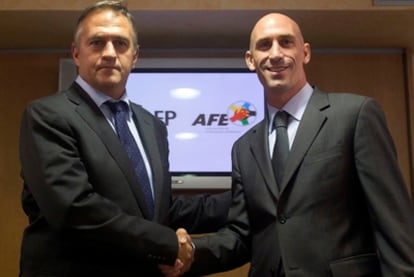Spanish soccer season to begin this weekend after strike called off
Clubs and players sign new collective agreement as players union leader talks up legal reform to prevent clubs evading financial realities
Spain's soccer season will finally kick off this weekend after the Association of Professional Footballers (AFE) and the Professional Football League (LFP) reached an agreement early Thursday morning on unpaid wages that puts an end to a strike by players that caused all matches to be called off last weekend.
After a marathon meeting that did not end until 5.30am on Thursday the AFE and the LFP resolved their differences and signed a new agreement on the working conditions for players.
The first game of the 2011-12 season will take place on Friday, when Girona hosts Elche in Segunda División. The opening match in the top division, between Sporting Gijón and Real Sociedad, will kick off on Saturday at 6pm. Real Madrid travels to the Romareda stadium to face Zaragoza on Sunday, while Barcelona will receive Villarreal at Camp Nou on Monday.
The matches that were suspended last week will be played on January 22, while those initially due to be played on that weekend will be held May 2-3.
The dispute focused on guarantees for the unpaid wages of around 200 players owed some 50 million euros. As well as seeking redress for the players in question - some have gone unpaid for months and wages in Segunda División are far from princely for the most part - the AFE sought assurances on a fund for future cases of non-payment and a rule that would see recalcitrant clubs relegated for failing to pay their players.
The LFP said on August 3 that it had secured a salary guarantee fund in agreement with the clubs worth 10 million euros per season - equating to 240,000 euros for each Primera División player and 120,000 euros for those plying their trade in Segunda. The AFE on August 16 called the announcement "completely false" and revealed that the guarantee only amounted to 60,000 euros for Primera players and 40,000 euros for Segunda players.
AFE president Luis Rubiales said the outcome of negotiations had been "completely satisfactory for the players" and that the financial straits of the 200 affected by unpaid wages would be resolved. Rubiales added that the "future approval of the new Insolvency Law should be a turning point," in Spanish soccer. Under current regulations, a club in financial difficulty can simply hide behind 2002 solvency legislation to avoid declaring itself bankrupt. The first to choose this recourse was Las Palmas, and since then 21 clubs have followed suit. In the most recent case, Zaragoza handed itself over to the administrators with some 130 million of debt. Even so, loopholes in third-party ownership deals allowed Zaragoza to acquire goalkeeper Roberto from Benfica for a fee in excess of 8 million euros - a deal financed by a sports investment company.
After the meeting on Thursday, Rubiales spoke of "a change in the regulations that would guarantee players' salaries in the case of an administrative relegation."
Both parties gave a little ground and the most important thing is that the ball will start rolling," said LFP president José Luis Astiazarán.

Tu suscripción se está usando en otro dispositivo
¿Quieres añadir otro usuario a tu suscripción?
Si continúas leyendo en este dispositivo, no se podrá leer en el otro.
FlechaTu suscripción se está usando en otro dispositivo y solo puedes acceder a EL PAÍS desde un dispositivo a la vez.
Si quieres compartir tu cuenta, cambia tu suscripción a la modalidad Premium, así podrás añadir otro usuario. Cada uno accederá con su propia cuenta de email, lo que os permitirá personalizar vuestra experiencia en EL PAÍS.
¿Tienes una suscripción de empresa? Accede aquí para contratar más cuentas.
En el caso de no saber quién está usando tu cuenta, te recomendamos cambiar tu contraseña aquí.
Si decides continuar compartiendo tu cuenta, este mensaje se mostrará en tu dispositivo y en el de la otra persona que está usando tu cuenta de forma indefinida, afectando a tu experiencia de lectura. Puedes consultar aquí los términos y condiciones de la suscripción digital.








































